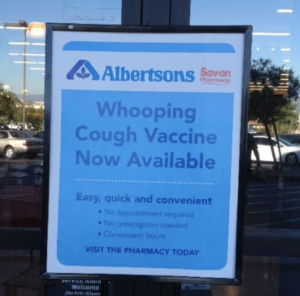Whooping cough is a highly contagious respiratory infection caused by bacteria named Bordetella pertussis. Whooping cough is a vaccine-preventable disease that is spreading rapidly. In fact, the US Health Department is calling it “a problem of epidemic proportions(i)” in the state of California. The epidemic is not limited to California. The Centers for Disease Control (CDC) have reported that from January 2014 to June 2014 there has been 9,964 cases of Whooping Cough “reported to CDC by 50 states and Washington, D.C.; this represents a 24% increase compared with the same time period in 2013.(ii)”

ESwab™ is designed to maintain the viability of aerobic, anaerobic and fastidious bacteria. In a study, titled “ESwab™ System for Bordetella Testing,” presented by Ken Van Horn, Carol Audette and Lamela Umaru during the American Society for Microbiology 111th General Meeting, in May 2011, it was concluded that “ESwab™ maintains sufficient B. pertussis and B. parapertussis viability to permit detection in culture and preserves cell and DNA integrity for DFA and PCR detection after 96 hours of refrigerated storage(iii).”
In some occasions, patients exhibiting symptoms of bacterial Whooping Cough may also be co-infected with common respiratory viruses. A child presenting with a respiratory infection the causative agent could be bacterial (Bordetella) or viral if the symptoms are not clear cut.
UTM™ Universal Transport Medium is a viral transport medium, manufactured by COPAN, for collection, transport, maintenance and long term freeze storage of Viruses, such as influenza. A recent study, published in the Journal of Clinical Microbiology, titled “Comparative Evaluation of the Diagenode Multiplex PCR Assay on the BD Max System versus a Routine In-House Assay for Detection of Bordetella pertussis,” shows the versatility of UTM™ as a collection and transport system. UTM™ was used to transfer the specimens, and from the positive specimens “42.1% were coinfected with respiratory viruses” as well as bacterial Bordetella pertussis (iv).
Another study published in the Journal of Clinical Microbiology titled “Comparison of Rates of Positivity for Bordetella pertussis by Real-Time PCR between Specimens Collected with Rayon Swabs on Aluminum Wire Shaft in Amies Gel with Charcoal and Specimens Collected with Flocked Swabs in Universal Viral Transport Medium during an Epidemic (v)” coincides with the findings of the previously mentioned article. In fact, it concludes that “a comparison of real-time PCR positivity rates for Bordetella pertussis between specimens collected with rayon swabs on an aluminum wire shaft in Amies gel with charcoal and those collected with flocked swabs in universal viral transport medium [UTM™] during an epidemic revealed that their performances were comparable.
Both publications find UTM™ is a cross-platform medium proven to be good for viruses, as well as Bordetella. COPAN’s complete array of products have a proven track record, through numerous clinical and scientific publications, demonstrating their high quality and reliability. COPAN has experience responding to epidemics, like Whooping Cough, by producing products for specimen collection and transport in a timely manner.
Whooping Cough is a preventable disease. Babies, in particular, are a population that needs protection because of the highly contagious nature of the bacterial disease. In fact, if babies 1 year or younger catch Whooping Cough repercussion can be severe, with half of them ending up in hospitals. The CDC suggests that “you can protect babies from whooping cough by getting your vaccine and making sure your baby gets [the] vaccines (vi).”
About COPAN Group
With a reputation for innovation, COPAN is the leading manufacturer of collection and transport systems in the world. COPAN’s collaborative approach to pre-analytics has resulted in Flock Swabs, ESwab, UTM™ and modular laboratory automation, WASP® and WASPLab™. For more information about COPAN Group, visit http://www.copaninnovation.com.
Citations
(i) Christensen, Jen. California declares whooping cough epidemic. CNN. June 16, 2014. http://www.cnn.com/2014/06/13/health/whooping-cough-california/ Accessed July 7th, 2014.
(ii) Pertussis Outbreak Trends. Centers for Disease Control, CDC. http://www.cdc.gov/pertussis/outbreaks/trends.html. Accessed July 7th, 2014.
(iii) Van Horn, Ken et al. ESwab™ System for Bordetella Testing. Poster Session ASM – 111th General Meeting, May 2011, New Orleans, LA.
(iv) Kenicer, Juliet et al.Comparative Evaluation of the Diagenode Multiplex PCR Assay on the BD Max System versus a Routine In- House Assay for Detection of Bordetella pertussis. Published ahead of print 30 April 2014, doi: 10.1128/JCM.00212-14 J. Clin. Microbiol. July 2014 vol. 52 no. 7 2668-2670.
(v) Arbefeville, Sophie and Patricia Ferrieri. Comparison of Rates of Positivity for Bordetella pertussis by Real-Time PCR between Specimens Collected with Rayon Swabs on Aluminum Wire Shaft in Amies Gel with Charcoal and Specimens Collected with Flocked Swabs in Universal Viral Transport Medium during an Epidemic. Published ahead of print 30 April 2014, doi: 10.1128/JCM.01070-14 J. Clin. Microbiol. July 2014 vol. 52 no. 7 2656-2658
(vi) “Protect Babies from Whooping Cough (Pertussis).” Centers for Disease Control, CDC. http://www.cdc.gov/features/pertussis/ Page Last Updated: February 10, 2014. Accessed July 7ty, 2014.

